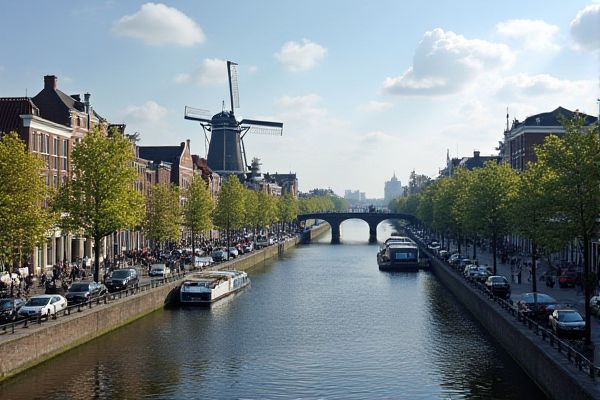
Cost of living in Netherlands: Average rent in major cities. Dutch transportation costs. Grocery expenses comparison. Health insurance requirements. Utility costs overview. Dining out expenses. Education and tuition fees. Entertainment and leisure costs. Tax rates and implications. Salary expectations versus cost.
Average rent in major cities
The average monthly rent in major Dutch cities varies significantly: Amsterdam averages around EUR2,275 for a one-bedroom apartment, The Hague averages EUR1,375.78, Rotterdam and Eindhoven average EUR1,106.42, and Utrecht also averages EUR1,106.42. These prices reflect the high demand and regional variations in the Dutch rental market. For more detailed information on the regional differences in rental costs, visit the Average Rent in Netherlands analysis. Such insights are crucial for understanding the dynamics affecting housing affordability in the Netherlands.
Dutch transportation costs
The Netherlands boasts the second most expensive public transport in the world, with an average one-way fare of $3.65 and a monthly pass priced at $87.51. Dutch cities such as Eindhoven, The Hague, and Rotterdam rank among the most costly globally when it comes to public transport expenses. For more details on this topic, you can visit the article on NL Times, which discusses the financial implications for daily commuters in these urban areas.
Grocery expenses comparison
In the Netherlands, grocery expenses are 14.6% lower compared to the United States, with items like bread, local cheese, and various fruits and vegetables being significantly cheaper. However, some items like boneless chicken breast and bananas are more expensive in the Netherlands. For more information on the cost of living differences between these countries, you can visit the detailed analysis provided by MyLifeElsewhere which offers insights into these and other economic comparisons.
Health insurance requirements
In the Netherlands, everyone who lives or works there must have Standard Health Insurance, which covers essential medical care such as general practitioner visits, hospital treatment, and prescription medication. The premium is fixed and the same for all, with an additional income-related contribution, and children under 18 are insured free of charge. For more information, you can visit the official Government Website to learn about the detailed provisions of health insurance in the country.
Utility costs overview
In the Netherlands, utility costs can be a significant part of the monthly budget, with water, gas, and electricity expenses ranging considerably based on consumption and property size. Gas costs approximately EUR0.0802 per kilowatt-hour, while electricity and water costs are around EUR0.2659 per kilowatt-hour and EUR2.39 per cubic meter respectively. Beyond these basic rates, there are additional municipal taxes specifically for water services. For those interested in learning more about these living expenses, visiting the Cost of Living in Netherlands page can provide further insights into the financial aspects of residing in this country.
Dining out expenses
Dining out in Amsterdam offers a variety of options to suit different budgets. For those looking for an affordable meal, an inexpensive restaurant typically charges between EUR15 and EUR20 per person. Mid-range dining experiences are available at prices ranging from EUR30 to EUR50 per person, offering a more refined culinary experience. For enthusiasts of fine dining, the price starts at EUR75 or more, ensuring a premium experience. Additionally, enjoying a local pint of beer usually costs around EUR5 to EUR6, while a glass of wine can be savored for approximately EUR4 to EUR5. For more details on these costs, visit VanOne Relocation Services to explore comprehensive insights.
Education and tuition fees
In the Netherlands, tuition fees for EU/EEA, Swiss, and Surinamese students are approximately EUR2,530 per year, while non-EU/EEA students can pay significantly higher, ranging from EUR6,000 to EUR30,000 per year, depending on the institution and program. Additional costs that students should consider include application fees, which can vary between EUR50-100, and for non-EU/EEA students, a student visa application fee of EUR228. For a comprehensive guide on the cost of studying in this country, refer to Times Higher Education, which provides valuable advice and insights.
Entertainment and leisure costs
Dutch households dedicate around 18% of their annual budget, translating to approximately EUR6,000, on leisure activities. This includes substantial expenditures on holidays and accommodations, with holidays accounting for EUR2,200 annually, and hotels, restaurants, and pubs contributing to another EUR1,300 each year. Singles under 65 tend to spend a significant share of their leisure budget on nights out, reflecting their lifestyle choices. In contrast, single parents and families with children are more inclined to invest in recreational goods and activities that cater to a broader range of interests. For more details, you can refer to the Study on Dutch Households' Leisure Expenditure which provides insights into these spending patterns.
Tax rates and implications
In the Netherlands, income is divided into three categories, each with its own tax rates: Box 1, which pertains to work and home ownership, has progressive tax rates up to 49.5%. Box 2, which addresses substantial interests, is taxed at 24.5% for the first EUR67,000 and 33% thereafter. Finally, Box 3, which covers savings and investments, is taxed at a flat rate of 36%. It's noteworthy that there are no local taxes on income, simplifying the tax burden somewhat. For further elaboration on this system, you can visit the Taxes on Personal Income section on their website.
Salary expectations versus cost
The average monthly salary after taxes in the Netherlands is approximately $3622, which provides enough financial support to cover living expenses for about 1.7 months. This calculation is based on the total monthly cost of living for one person, which stands at $2088. For more detailed information on living expenses and salary data in the Netherlands, you can visit the Living Cost website, which offers comprehensive insights into various financial aspects of living in this part of Europe.
